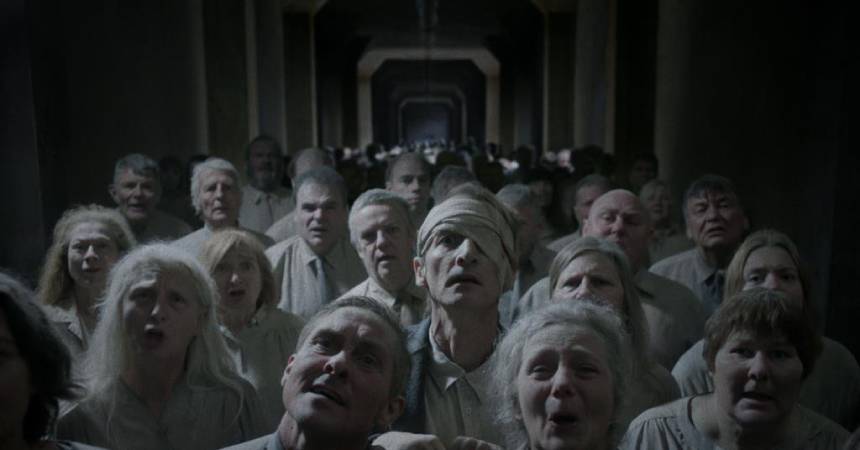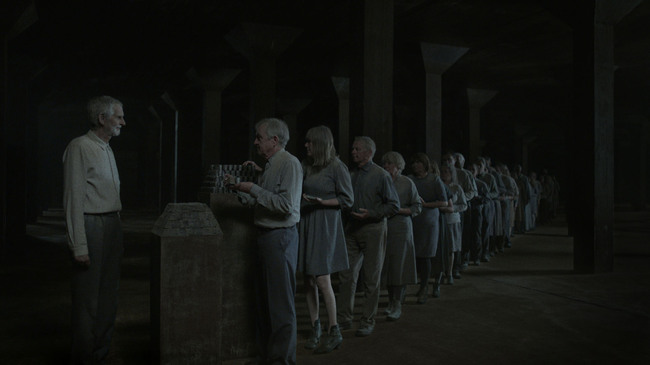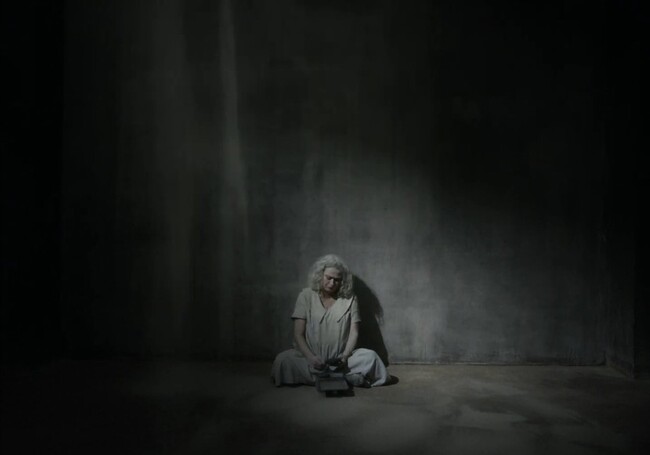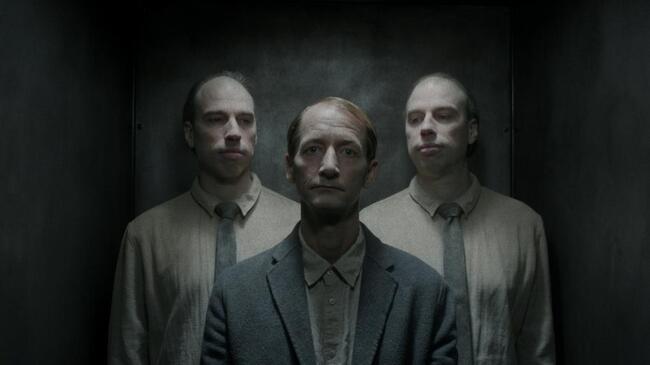Tallinn 2020 Review: THE PENULTIMATE, The Grotesque Comedy on the Absurdity of Human Condition

Grotesque humor and the absurdity of existence accompany the protagonist of Jonas Kærup Hjort´s feature-length debut The Penultimate almost every step he takes. The opening scene is of a water inspector leading a donkey and leaving it tied to a tree in a barren wasteland before entering into an anonymous edifice.
The scene prompts a Montypythonesque remembrance which will soon become heavily laced with Sartrean flourishes. The French existentialist is not the only one whose ideas are going to be incanted from the being-is-suffering club of renowned thinkers.
Absurdity and allegory lovingly embrace each other as an insignificant inspector arrives into a maze-like building to read water meters. Plunged into the dark and surreal (under)world, he encounters a coterie of characters.
Some ramble bleak or nonsensical prophecies, others attack the protagonist or strike shady deals while the leading character remains equally perplexed. Only his anxiety and frustration levels peak. His whole life shrinks to simple raison d´être, finding a way out.
In a rare lighthearted yet no less absurd and befuddling moment, the protagonist manages to father an offspring in the grim Spartan cellar filled with nothingness and irritating bird screeches. To properly savor the hell-is-others state of mind, the director equips him with pale twins that shadow him wherever he goes, whatever he does.
The sole reason that he maintains the remaining shreds of sanity, are the walks throughout the building and its never-ending rows of rooms that bear striking conceptual similarity to prison cells. His initial exit strategy experiences a light-at-the-the-end-tunnel reverie after he finds out an enigmatic person of the caretaker may wield the powers to effectively aborting his burdensome predicament leading him into the vastness of freedom.
Hjort translates a somewhat Schopenhauerian notion of existence into an escape-room allegory ripe with thinly veiled symbolism. Besides the ever-present and absolutely unhelpful twins, the frustrated clerk is occasionally paid a visit by one-(mute)-child chorus that showers him with questions modeled after the late German pessimist philosopher´s perception of being. The protagonist keeps on going fueled by what seems to be an irrational will and naïve persuasion that he can make it out of the imprisoning labyrinth of disorientation and desperation.
Hjort´s does not attempt to drown the overall allegory in covert or esoteric symbolism, the analogy has a fairly self-explanatory nature. Free of heavy intellectualizing, The Penultimate turns into a playful and actually enjoyable take on the existentialist story, if despair and constantly crushed aspirations and desires happened to incite a masochistic pleasure in viewers.
The water inspector bears a certain resemblance to his literary ancestors and their fate, the chief cashier of a bank Josef K. or the land surveyor K., from the pages of Franz K.´s novel. While Kafkaesque will surely become the most frequent label when referring to The Penultimate, it should be done so in regards to the lesser promoted interpretations of Kafka´s works, as grotesque and perverted comedies on the absurdity of the human condition and mankind´s plight.
The emerging Danish director utilizes a minimalist set design defined by big and empty spaces to stage simple and uncluttered scenes inclining to mostly symmetric composition. The corpse-like make-up of inhabitants in the labyrinthine dwelling invokes a strong sense of aesthetic déjà-vu. No infringement of signature poetics occurs, as Hjort is mostly epigone rather than plagiarist to the unique style of Roy Andersson.
While the scenes are haunted by the spirit of the Swedish master, Hjort crafts his own style. The major difference between the director of The Living tetralogy and the Danish newcomer happens to be Hjort´s use of close-ups and different angles invigorating the claustrophobic ordeal and less meticulously staged scenes compared to Andersson´s detailed compositions. While no tableaux vivants make presence, the Danish filmmaker and cinematographer Jacob Sofussen prepared a handful of memorable mise en scenes including a wedding in a Valhalla milieu set against swallowing nothingness.
Jonas Kærup Hjort´s The Penultimate suffers from bouts of sometimes too literal metaphors in the existentialist territory. However, the amalgam of vestiges of nonsensical, gloom surrealism, and a morbid fascination with the tortuousness of being contribute to a surprisingly intriguing feature debut and above all, a whimsical traumedy.
The Penultimate
Director(s)
- Jonas Kærup Hjort
Writer(s)
- Jonas Kærup Hjort
Cast
- Jesper Balle
- Joen Bille
- Rasmus Braun
- Steen Dahl










